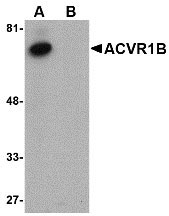ACVR1B Antibody
- 产品详情
- 实验流程
- 背景知识
Application
| WB, E |
|---|---|
| Primary Accession | Q04771 |
| Other Accession | NP_001096, 4501895 |
| Reactivity | Human, Mouse |
| Host | Rabbit |
| Clonality | Polyclonal |
| Isotype | IgG |
| Calculated MW | 57153 Da |
| Concentration (mg/ml) | 1 mg/mL |
| Conjugate | Unconjugated |
| Application Notes | ACVR1B antibody can be used for detection of ACVR1B by Western blot at 1 µg/mL. |
| Gene ID | 90 |
|---|---|
| Other Names | Activin receptor type-1, 2.7.11.30, Activin receptor type I, ACTR-I, Activin receptor-like kinase 2, ALK-2, Serine/threonine-protein kinase receptor R1, SKR1, TGF-B superfamily receptor type I, TSR-I, ACVR1, ACVRLK2 |
| Target/Specificity | ACVR1; At least three isoforms of ACVR1B are known to exist. This antibody is predicted to have no cross-reactivity to ACVR1 or ACVR1C. |
| Reconstitution & Storage | ACVR1B antibody can be stored at 4℃ for three months and -20℃, stable for up to one year. As with all antibodies care should be taken to avoid repeated freeze thaw cycles. Antibodies should not be exposed to prolonged high temperatures. |
| Precautions | ACVR1B Antibody is for research use only and not for use in diagnostic or therapeutic procedures. |
| Name | ACVR1 |
|---|---|
| Synonyms | ACVRLK2 |
| Function | Bone morphogenetic protein (BMP) type I receptor that is involved in a wide variety of biological processes, including bone, heart, cartilage, nervous, and reproductive system development and regulation (PubMed:20628059, PubMed:22977237). As a type I receptor, forms heterotetrameric receptor complexes with the type II receptors AMHR2, ACVR2A or ACVR2B (PubMed:17911401). Upon binding of ligands such as BMP7 or GDF2/BMP9 to the heteromeric complexes, type II receptors transphosphorylate ACVR1 intracellular domain (PubMed:25354296). In turn, ACVR1 kinase domain is activated and subsequently phosphorylates SMAD1/5/8 proteins that transduce the signal (PubMed:9748228). In addition to its role in mediating BMP pathway-specific signaling, suppresses TGFbeta/activin pathway signaling by interfering with the binding of activin to its type II receptor (PubMed:17911401). Besides canonical SMAD signaling, can activate non-canonical pathways such as p38 mitogen-activated protein kinases/MAPKs (By similarity). May promote the expression of HAMP, potentially via its interaction with BMP6 (By similarity). |
| Cellular Location | Membrane; Single-pass type I membrane protein. |
| Tissue Location | Expressed in normal parenchymal cells, endothelial cells, fibroblasts and tumor-derived epithelial cells |
For Research Use Only. Not For Use In Diagnostic Procedures.
Provided below are standard protocols that you may find useful for product applications.
BACKGROUND
ACVR1B Antibody: Activins are dimeric growth and differentiation factors which belong to the transforming growth factor-beta (TGF-beta) superfamily of structurally related signaling proteins. Activins signal through a heteromeric complex of receptor serine kinases which include at least two type I and two type II receptors. ACVR1B, also known as activin receptor-like kinase 4 (ALK4), is a type I receptor for activin and plays major roles in cell differentiation, growth arrest and apoptosis. Like another type I activin receptor ACVR1C, ACVR1B can mediate signaling by ligands such as Nodal, Xnr1, GDF-1/3, activin B and activin AB. In Xenopus embryos, expression of a dominant-negative form of ACVR1B blocked all mesoderm-inducing ligands, while expression of a dominant negative ACVR1C only blocked Nodal and Xnr1 signaling, suggesting that the ACVR1B and ACVR1C possess distinct functions.
REFERENCES
Tsuchida K, Sawchenko PE, Nishikawa S, et al. Molecular cloning of a novel type I receptor serine/threonine kinase for the TGF beta superfamily from rat brain. Mol. Cell. Neurosci.1996; 7:467-78.
Reissmann E, Jornvall H, Blokzijl A, et al. The orphan receptor ALK7 and the activin receptor ALK4 mediate signaling by nodal proteins during vertebrate development. Genes Dev.2001; 15:2010-22.
Tsuchida K, Nakatani M, Yamakawa N, et al. Activin isoforms signal through type I receptor serine/threonine kinase ALK7. Mol. Cell Endocrinol.2004; 220:59-65.
终于等到您。ABCEPTA(百远生物)抗体产品。
点击下方“我要评价 ”按钮提交您的反馈信息,您的反馈和评价是我们最宝贵的财富之一,
我们将在1-3个工作日内处理您的反馈信息。
如有疑问,联系:0512-88856768 tech-china@abcepta.com.























 癌症的基本特征包括细胞增殖、血管生成、迁移、凋亡逃避机制和细胞永生等。找到癌症发生过程中这些通路的关键标记物和对应的抗体用于检测至关重要。
癌症的基本特征包括细胞增殖、血管生成、迁移、凋亡逃避机制和细胞永生等。找到癌症发生过程中这些通路的关键标记物和对应的抗体用于检测至关重要。 为您推荐一个泛素化位点预测神器——泛素化分析工具,可以为您的蛋白的泛素化位点作出预测和评分。
为您推荐一个泛素化位点预测神器——泛素化分析工具,可以为您的蛋白的泛素化位点作出预测和评分。 细胞自噬受体图形绘图工具为你的蛋白的细胞受体结合位点作出预测和评分,识别结合到自噬通路中的蛋白是非常重要的,便于让我们理解自噬在正常生理、病理过程中的作用,如发育、细胞分化、神经退化性疾病、压力条件下、感染和癌症。
细胞自噬受体图形绘图工具为你的蛋白的细胞受体结合位点作出预测和评分,识别结合到自噬通路中的蛋白是非常重要的,便于让我们理解自噬在正常生理、病理过程中的作用,如发育、细胞分化、神经退化性疾病、压力条件下、感染和癌症。






